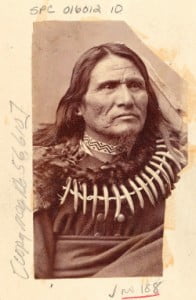- (800) 416-8102
- info@nativepartnership.org
- 16415 Addison Rd, Suite 200, Addison, TX 75001-3203
Indians are Persons: Standing Bear’s Speech
By Moderator

I was so moved by the words of Standing Bear’s speech that I decided to republish it here. (If you didn’t catch my May 9 blog post, Indians are “Persons” Under the Law, I suggest you read it first.)
As the story goes, Standing Bear rose and, only half facing the court, held out his right hand and stood there motionless “so long that the stillness of death which had settled down on the audience became almost unbearable.” Finally, he looked up at the judge and said:
That hand is not the color of yours, but if I prick it, the blood will flow, and I shall feel pain. The blood is of the same color as yours. God made me, and I am a man. I never committed any crime. If I had, I would not stand here to make a defense. I would suffer the punishment and make no complaint.
I seem to be standing on a high bank of a great river, with my wife and little girl at my side. I cannot cross the river, and impassable cliffs arise behind me. I hear the noise of great waters; I look, and see a flood coming. The waters rise to our feet, and then to our knees. My little girl stretches her hands toward me and says, ‘Save me.’ I stand where no member of my race ever stood before. There is no tradition to guide me. The chiefs who preceded me knew nothing of the circumstances that surround me. I hear only my little girl say, ‘Save me.’ In despair I look toward the cliffs behind me, and I seem to see a dim trail that may lead to a way of life. But no Indian ever passed over that trail. It looks to be impassable. I make the attempt.
I take my child by the hand, and my wife follows after me. Our hands and our feet are torn by the sharp rocks, and our trail is marked by our blood. At last I see a rift in the rocks. A little way beyond there are green prairies. The swift-running water, the Niobrara, pours down between the green hills. There are the graves of my fathers. There again we will pitch our teepee and build our fires. I see the light of the world and of liberty just ahead.
Taking a long pause again, Standing Bear finally turned toward the judge “with such a look of pathos and suffering on his face that none who saw it will forget it.” He said:
But in the center of the path there stands a man. Behind him I see soldiers in number like the leaves of the trees. If that man gives me the permission, I may pass on to life and liberty. If he refuses, I must go back and sink beneath the flood.
You are that man.
It is said by Thomas Tibbles, the court reporter, that tears ran down the judge’s face and that General Crook buried his face in his hands — and yet the court’s ruling was based not on sympathy but on the Constitution and the law. You can read more of the details surrounding Standing Bear’s speech online.